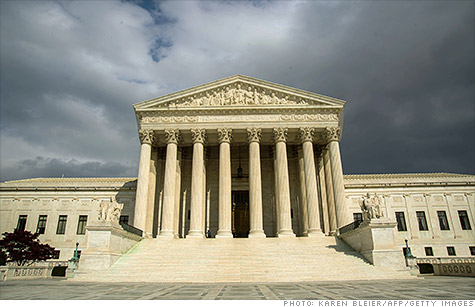Search News

With Medicaid expansion left up to the states, the Congressional Budget Office said that 6 million Americans could lose out on coverage.
NEW YORK (CNNMoney) -- The Supreme Court's health reform ruling could leave 6 million Americans out of the expansion of Medicaid set to begin in 2014, the Congressional Budget Office said Tuesday.
The CBO now estimates that 7 million uninsured will be covered through the expansion, down from its prior estimate of 13 million.
Health reform has a number of provisions aimed at reducing the ranks of the uninsured -- Medicaid's expansion is one of the most controversial.
Of the 6 million who lose out on the expansion, 2 million will get subsidized coverage through the new insurance exchanges that will be established by health care reform, according to the CBO.
Under the law, all adults with incomes at or below 133% of the federal poverty level will be eligible for insurance coverage under Medicaid.
But the Supreme Court, while upholding the Affordable Care Act, said last month that states can opt out of the Medicaid expansion without any threat of losing other federal funding for the program.
The CBO, explaining its new estimate, said it now expects that some states won't expand their programs at all.
The estimated net cost of the expansion also came down, to $1.2 trillion between 2012 and 2022 from $1.3 trillion, since fewer people on Medicaid means lower costs to government.
The federal government will pick up the total cost of the expansion for the first three years, after which the funding will phase down to 90%.
Many poor adults who are not eligible for Medicaid under the current system but would have qualified under the expansion are waiting to see if their states will participate in Medicaid expansion.
The health care law, enacted in 2010, is one of President Obama's signature policy changes. His Republican rival, Mitt Romney, says he would push for its repeal.
Officials in 26 states challenged the Medicaid provision in court. And a number of governors have said since the Supreme Court ruling that they would not participate.
For example, Republican Gov. Scott Walker of Wisconsin has said his state won't move ahead on health reform until after the November election.
In states that opt out, the federal government will help cover the cost of buying private insurance for residents who are just above the poverty line. But those below the poverty line aren't eligible for these subsidies.
Roughly 62 million people are now covered by Medicaid, which has become increasingly costly for states.
And though Washington will pick up much of the tab of the Medicaid expansion, having to foot even 10% of the bill may be too big a burden for cash-strapped states.
"You hear many people saying, 'This is a great deal. Why would you pass it up,' said Andrea Maresca, director of foreign policy and strategy at the National Association of Medicaid Directors. "But there was a major shift in what the statute meant and you can't expect elected officials to make an immediate decision overnight."
Despite the heated political rhetoric surrounding the expansion, Maresca said that she expects many states to phase in some version of the expansion, even if it's not by the time that the federal government rolls out the program in 2014.
"You have to separate out the policy decisions and the politics that are playing into a lot of statements being made," she said. "Not every state immediately jumped on board with some very popular decisions that they have in place now."
In a separate report Tuesday, the CBO said a House Republican bill to repeal the health reform law entirely would increase deficits by $109 billion over 10 years. The bill passed the House last week but is not expected to get through the Senate. ![]()
| Overnight Avg Rate | Latest | Change | Last Week |
|---|---|---|---|
| 30 yr fixed | 3.80% | 3.88% | |
| 15 yr fixed | 3.20% | 3.23% | |
| 5/1 ARM | 3.84% | 3.88% | |
| 30 yr refi | 3.82% | 3.93% | |
| 15 yr refi | 3.20% | 3.23% |
Today's featured rates:
| Latest Report | Next Update |
|---|---|
| Home prices | Aug 28 |
| Consumer confidence | Aug 28 |
| GDP | Aug 29 |
| Manufacturing (ISM) | Sept 4 |
| Jobs | Sept 7 |
| Inflation (CPI) | Sept 14 |
| Retail sales | Sept 14 |